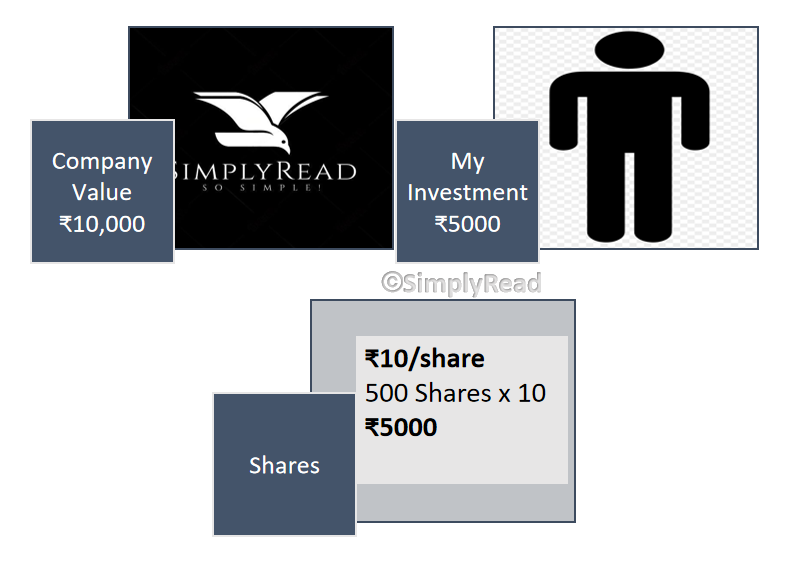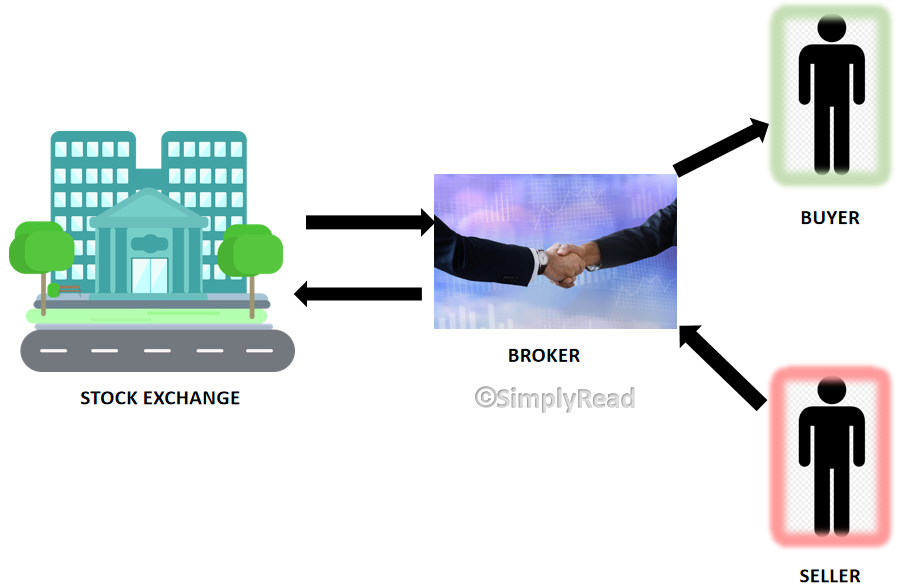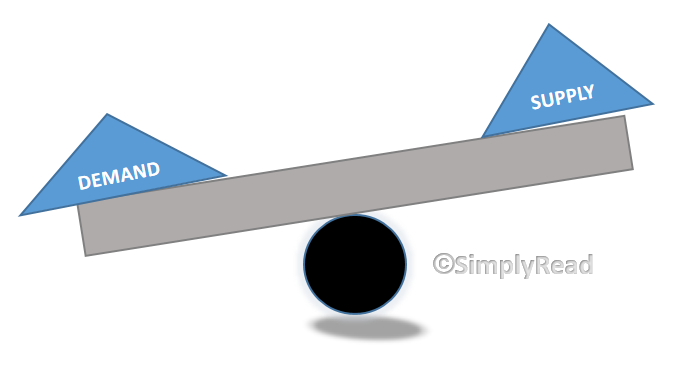A beginner will have a lot of questions running in his/her mind on the stock market. What is the stock market? How it is working? Is the stock market only for rich people? and the questions go on. Therefore, Let’s discuss the Stock market basics and 10 things to know for beginners before entering the stock market. Dear reader, Welcome to SimplyRead. Yes, here things are So Simple!
STOCK MARKET BASICS-10 THINGS FOR BEGINNERS

Stock market learning is very vast like the sea. It cannot be mastered in a single day. Even the experienced investors/traders are learning it every day. Indeed, Any learning follows the same rule. But, to start as a beginner there are some important things to know before entering the stock market.
Also Read: Lets Multiply! Not just Numbers but real money$ – SimplyRead
1.WHAT IS STOCK MARKET?
A stock market is a place where buyers and sellers come together on a common platform and makes buying and selling of stocks. In corporate offices, the manager manages the team. Similarly, the Stock exchange maintains the stock market and facilitates the buyers and sellers to make transactions. In the early days, transactions were made on paper and people run to the stock exchange, raise hands, telephonic orders, etc. The Internet has made it revolutionary to trade online with a single click.
2.WHAT IS A SHARE?
A share is a portion of ownership in a company or asset. Moreover, A Shareholder is a person who owns a share of a company. Let’s understand this better with an example. Consider I am going to start a company named “SimplyRead”. The total capital required to start this company is ₹10,000. I already have ₹5,000 but lack the remaining. I have decided to generate the deficit capital in the form of shares and fix share prices at ₹10/share. Now, if I get 500 shares (500*10=₹5000) I can able to generate the deficit amount and start my company. The investors who bought my company shares will have ownership of SimplyRead.

3.STOCK EXCHANGE
As already said, the Stock exchange manages the transaction between buyer and seller. To interact with the stock exchange investors/traders need to have a broker. Brokers may be banks or brokerages and will help to buy or sell stocks through the exchange. In India, there is a separate exchange for stocks and commodities. Some major exchanges are NSE(National Stock Exchange), BSE(Bombay Stock Exchange), and MCX(Multi Commodity Exchange).

4.TOOLS AND ACCOUNTS
In order to transact(buy/sell) in exchange, the trader/investor needs the below:
- Bank Account
- Trading Account
- Demat Account
Most of the brokerages provide Trading Account with Demat Account and banks provide all of them. Brokerages and banks offer the user interface, Support, and other services for the account holders.
5.TRADING ACCOUNT VS DEMAT ACCOUNT
A Trading account is an interface used to transact(buy/sell) stocks through exchange whereas a Demat(Dematerialized) account is for safekeeping the stocks in electronic form. Simply put, a trading account is an application or software whereas Demat is an account which is used to store stocks in depositories.
6.DEPOSITORY
Any matter needs storage say cash or digital data. Cash can be stored in banks and vaults. Computers stores digital data in hard drives/cloud storage. In the same way, stocks are stored at central depositories in electronic form which is a safe vault. In India, there are two depositories namely NSDL or National Securities Depositories Limited(click here) and CDSL or Central Depositories Services(click here). Moreover, Government backs and regulates these depositories as an entity known as SEBI (Securities and Exchange Board of India)
7.WHO DETERMINES STOCK PRICE?
Supply and Demand determine the price of the stock in the live market. For an instance, Onion is being sold in the vegetable market for ₹20/Kg on a normal day. Unfortunately, there is a heavy flood and rainfall in the majority of the nation and so the deficit occurs due to crop field damages and transportation issues. As a result, supply decreases, and demand increases. Obviously, the price of Onion will raise to ₹40/Kg due to the reduced supply. Similarly, in the stock market when the company listed performs well more people tend to buy their shares, demand increases and the stock price will increases.
Simply put, Demand ∝ 1/Supply ( Demand is inversely proportional to supply) i.e If demand increases supply decreases and if demand decreases supply increases. Whenever the demand increases stock price increases (Demand ∝ Stock price).

8.INVESTING VS TRADING
Most often, we listen to people saying these words namely traders and investors. Are you a trader or investor? the question comes up when we speak about the stock market. Let’s get clarified. A Trader is a person who buys and sells stocks in a day or the next day to get profit so quickly whereas an Investor invests (buys shares) in a company and waits for the long-term(maybe a year or 5 years) to reap the profits from the investment.
Also, the Investor believes that the invested company will grow in the future so that the company’s share price also increases simultaneously. On the other hand, a Trader predicts the daily movement or hourly movement of stock price and trades within the stipulated time during the market hours. Indian stock market operates from 9:15 AM to 3:30 PM IST whereas the UnitedStates stock market operates between 9:30 AM to 4 PM EST.
9.ASSET CLASS
Asset classes are nothing but the types of assets. In simple words, they are the Investment types. Here are the asset types which can be invested or traded in the stock market.
- Equity: Stocks
- Mutual Funds: Bundle of stocks and other instruments.
- Derivatives: Futures and Options
- Commodity: Gold, Silver, Crude Oil, Steel, etc.
- Sovereign Gold Bonds (SGB) can be traded in the market provided in Demat form. Click here to know more about Gold Investment.
- National Pension Scheme (NPS), Employee Provident Fund (EPF), and other instruments which invest part of investments in the Stock market.
10.INDICES
In the books we read, there will be a page named index. The index helps navigate quickly to the desired page, to skim the content and the value of the book easily in a single page. Likewise, the stock market has Indices where we can track the actual market movement with the help of these indices. In India, Some of the major indices are Nifty50, BankNifty, IndiaVix, and BSE Sensex whereas the United States include NASDAQ, DOW Jones, S&P 500, and other countries that have their indices.
What are these indices comprised of? Of course, stocks. Nifty50 contains the top 50 listed companies from all sectors based on the Market Capital (simple its market value). Why all sectors are included? Well, A single sector is not driving the stock market. That’s why stocks from all sectors such as IT, Infra, Metal, banks, Pharma, etc. are included.
TO WRAP THINGS UP
As written at the beginning of this article, Learning about the stock market is vast like a sea. Keep updating your knowledge on the stock market and watch our blog posts regularly for updates.
If you have any clarification on the topic discussed, comment your questions in the comment box.
Thanks for visiting SimplyRead! So Simple!
Also Read: Invest In Yourself-The Skeleton Key to unlock your potential! – SimplyRead



Superb! Basics has been explained so simply….
Hey Harish,
Thanks for your valuable comment! That’s how SimplyRead works. So Simple!
I liked it you are a great writer. I appreciate your work !!!
Hey Ram,
Thanks for your kind words. Keep following my blog!